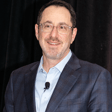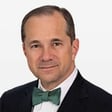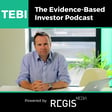Become a Creator today!Start creating today - Share your story with the world!
Start for free
00:00:00
00:00:01

Ep 24: Ben Johnson on Morningstar's Active/ Passive Baromoter
One of the smartest advocates of investing in low-cost index funds and ETFs is Ben Johnson, Director of Global ETF Research at Morningstar.
In the latest TEBI Podcast, Ben explains the Morningstar Active/ Passive Barometer, how it differs from the SPIVA scorecard run by S&P Dow Jones Indices, and what we can learn from the data it produces.
Transcript
Introduction to Evidence-Based Investing
00:00:04
Speaker
Hello and welcome to the latest Tebby podcast brought to you by Regis Media. If you're interested in evidence-based investing and how the financial industry really works, you've come to the right place. Our guest on this episode is Ben Johnson, who is Director of Passive Funds Research at Morningstar. Ben, welcome to the Tebby podcast. Thank you for having me, Robin.
Role of Ben Johnson at Morningstar
00:00:30
Speaker
So, Director of Passive Funds Research, what does that entail? What our core deliverable is, is research and ratings on index mutual funds, exchange traded funds, and other forms of systematic approaches to portfolio construction, to security selection, and combining those securities in the context of a portfolio.
00:00:52
Speaker
So my team numbers now a dozen analysts globally and we collectively assign Morningstar analyst ratings to more than 600 such funds globally.
Active Passive Barometer vs SPIVA
00:01:05
Speaker
I need to ask you about your active passive barometer, because that's presumably an important part of what you do. On Tebi, the Evans-based investor, we often feature SPIVA, the S&P Dow Jones version, if I'm allowed to mention that. Just explain how your barometer differs from that.
00:01:25
Speaker
So anytime I bring up our active passive barometer in front of an audience or in the format such as this, I actually use SPIVA as a point of reference because I think many in the marketplace are familiar with SPIVA, which is S&P's index versus active scorecard. So our active passive barometer attempts to improve upon this in a number of different ways. First and foremost, as SPIVA's name would imply, it looks at indices versus active managers.
00:01:54
Speaker
Now, indices are wonderful. We know many of them. They have brand names. They appear in the masthead of many a financial publication around the world every day. But by definition, they are simply a construct. They're not necessarily directly replicable, directly investable. So in the confines of the Morningstar active passive barometer, we compare active managers performance versus passively managed funds, which are ultimately underpinned by indexes.
00:02:24
Speaker
So our index, if you will, for active managers that we use to gauge their performance is actually a composite of all of the various index tracking funds in a given manager's Morningstar category. So we think this is an improvement upon index versus active to the extent that these are directly investable funds that investors can allocate their precious investment capital to.
00:02:49
Speaker
It reflects the fact that these funds have to charge fees to remain in business. So index funds tend to charge very low fees, which is fantastic, is really the core of their durable competitive advantage relative to active funds. But that's not reflected when you're looking simply at active manager's performance relative to an index.
00:03:10
Speaker
The other improvement is that because this is a composite of various index funds, you get different index types, different index portfolios in the mix.
Global Expansion of Active Passive Barometer
00:03:22
Speaker
So what we can see is that even looking at, for instance, U.S. small cap equity indexes,
00:03:28
Speaker
The Russell 2000, for instance, is actually a much lower hurdle for active managers than the S&P 600 small cap might be, given the latter's emphasis on higher quality names and the fact that it moves further up the market capitalization spectrum closer into mid-caps.
00:03:49
Speaker
You can kind of game this to some extent, not suggesting that S&P is, but certain active managers certainly do when they select their own benchmarks that they list in their funds prospectuses to either raise or lower the hurdle, if you will. So by presenting an amalgam of different indexes, what we do is we avoid cherry picking.
00:04:09
Speaker
So how often do you bring out this data? And of course SPIVA now looks at markets around the world and I think when I last asked you about this, this was something that you're looking to do, internationalise the barometer, is that right?
00:04:26
Speaker
That's exactly right. So we launched the US barometer in 2014. So we've been doing that for a number of years now, and we publish it on a semi-annual basis. Earlier this year, we launched our first Europe and UK version of the active passive barometer.
00:04:43
Speaker
And it's a study that we're continuing to look to replicate in other geographies. We've done versions of it in Japan, we've done versions of it in India, and we recently published a version of it in China as well, looking at the performance of Chinese stock pickers relative to index portfolios in that marketplace. And when was your last report, and what did it say, broadly speaking,
00:05:07
Speaker
Well, generally speaking, many of the trends we see sort of echo as you go around the world.
Challenges for Active Managers
00:05:15
Speaker
So our last report in the US, for example, was published this August and looked at data through the end of June of 2018. And what we see is that first and foremost, active managers have a very difficult time of
00:05:31
Speaker
really surviving to begin with. One of the primary shortfalls we see when we measure active managers success rates is that many that exist at the beginning of our measurement period fail to make it to the end of that same measurement period. And more often than not, that can be attributable to subpar performance, that those funds are shuttered because they've failed to live up to expectations or they've been merged into other funds for many of the same reasons.
00:05:59
Speaker
I mean, you're hardly going to close a fund because it's been top quartile for the last 10 years. Absolutely not. Much like anything else, it's a matter of survival of the fittest. And what we see in terms of determinants of active managers' successes is first and foremost, it has to do with how high they're setting the bar for themselves. And when I refer to the bar in this case, I mean the fees that they charge investors in their funds.
00:06:29
Speaker
think of the fee as effectively an ante on the part of an active manager. They're saying, I'm going to spot the market 100 basis points per annum, and I am making a bet that I will earn that 100 basis points that I'm charging investors in my fund back, and then some, and able to be able to overcome, to hurdle that bar, that I
00:06:54
Speaker
have complete control over in terms of how high or how low I will set that. So what we find in our results is that the lower the bar, the greater the odds of success, that low fee funds have across virtually every single category that we examine in our US study, higher than average odds of success relative to the most costly funds in that same Morningstar category.
Dominance of Active Management Despite Evidence
00:07:19
Speaker
Ben, I remember asking you this same question, I think about a year ago when you were last in London, and it's a question that taxes me all the time, and that is given all this evidence, say from the active-passive barometer that you yourselves produce, from SPIVA, from universities like Cass Business School here in London, and University of Chicago, and so on, all around the world, are used to surprise that active management is still so dominant.
00:07:49
Speaker
Well, I'm not at all surprised that active management is still dominant, given that I think first and foremost inertia is a very powerful force. And there's very real inertia facing investors in active funds that takes a number of forms. In many contexts, investors may have been investing with an active manager for a very long period of time.
00:08:14
Speaker
Markets have done quite well, especially over the course of the past decade, and there might be real tax implications for saying Sayonara to a given active manager and moving on down the road and investing in an index fund. It could take many a year, probably beyond most investors' horizon,
00:08:32
Speaker
to potentially recoup any losses that they would incur in the form of signing a check to the local tax collector by virtue of switching from one approach to portfolio construction to another. In some cases, the inertia is there and it just simply isn't sensible to jump over the divide.
00:08:51
Speaker
At the margin, in terms of allocating new capital to the markets, investing new monies in funds, what we see as measured in flows into funds and virtually any market you look at, be it the US, be it the UK, be it in Europe, what we're seeing is that more and more of the incremental money flowing into managed funds is going into index funds and oftentimes
00:09:17
Speaker
The preponderance of that money is going into the most broadly diversified, most inexpensive index funds on the menu. They're very plain vanilla. They're very dull. They're very uninteresting, which just so happens to make them fantastic long-term investment options.
Actively Managed ETFs in a Competitive Market
00:09:36
Speaker
As you say, there have been these huge inflows into passively managed funds and particularly ETFs. And actually, we're seeing a lot of actively managed ETFs come to the market as well. What's your take on that? I mean, this is a hugely bloated industry as it is.
00:09:58
Speaker
Do you think we've got enough financial products out there already? I think actively managed ETFs face a number of different challenges. First and foremost, the fact that they're actively managed. And having faced now a number of years of massive outflows in some cases, specifically
00:10:19
Speaker
if you look at U.S. equity funds and U.S. growth-oriented funds in particular have just been hemorrhaging assets. So actively managed ETFs I think have been mauled by some firms and launched by some firms as a means of trying to do anything they can to simultaneously kind of
00:10:40
Speaker
play defense and also put themselves on their forefoot and go on the offensive against what has been a formidable competitor in very broadly diversified very low-cost index tracking funds. In some cases there have been successes though they've been
00:10:58
Speaker
fairly few and fairly far between, primarily concentrated on the fixed income markets. So a small handful of especially short duration bond funds, almost money market substitute like funds, have gathered billions of dollars in investors' assets.
00:11:15
Speaker
These are corners of the markets where, if you think back to our discussion of our active passive barometer, fixed income markets and fixed income managers have generally fared more favorably versus their index competition than their stock picking peers. So active, far from being dead, is alive and thriving in bond fund land.
00:11:36
Speaker
And they also happen to be in the right place at the right time. So as I mentioned, much of this money is flowing into shorter duration, more conservative bond funds, which have a huge amount of appeal in volatile equity markets, as we've experienced recently, and rising interest rate environments, as we've experienced, at least in the context of the US market recently.
ETFs vs Traditional Index Funds
00:11:58
Speaker
Is it just me, or is there a danger we're making too much of ETFs, I mean, ETFs as opposed to traditional index funds? Okay, with an ETF, yes, you can, if you really wanted to buy 11 o'clock in the morning and sell at two o'clock in the afternoon, then buy again before closing or whatever, but other than that, supposed advantage, I mean, what advantages are there?
00:12:23
Speaker
It's difficult because for your average investor that has a long time horizon, the decision between ETF and index or tracker fund really boils down to increasingly a matter of personal preference and personal circumstances. That there might not necessarily be any direct advantage to an ETF in many cases. In other cases, it might be advantageous to use an ETF as opposed to an index mutual fund.
00:12:52
Speaker
So where I think ETFs win out tends to be for smaller investors that have smaller amounts of money to put into the marketplace. ETFs sort of lower the bar in terms of your ability to access these index tracking strategies at a price that's available to yourself as a small ordinary investor, the same price that's being paid by a very large institution, investing in exactly that same fund.
00:13:22
Speaker
That said, there are costs involved. So as the ET and ETF implies, these are exchange traded funds. So there are brokerage commissions, there are market impact costs, bid offer costs. All of the costs that are involved in transacting in ordinary shares apply equally in the case of transacting in ETFs. Now those might or might not be less than, greater than or equal to the cost that you would incur in investing in a tracker fund.
00:13:52
Speaker
It's really incumbent upon investors to sort of roll up their sleeves, dig in and do their homework when it comes to deciding whether they want to achieve exposure to a specific index via an ETF or a tracker fund because depending on their circumstances,
00:14:07
Speaker
One might be better than the other. Something that caught my eye recently was an article you wrote about labelling of products.
Misleading Labels on Exchange Traded Products
00:14:17
Speaker
Yes. Labelling of products and particularly exchange traded products is a big problem, isn't it?
00:14:22
Speaker
It can be problematic. So ETFs have become synonymous with the category. They're used as shorthand, much as oftentimes the word Kleenex can be used to refer to all forms of facial tissue. Not all types of exchange-traded products or ETPs are created equal. So ETFs, funds proper, registered funds, be they USITS, be they a 1940 Act funds, you name it,
00:14:52
Speaker
subject to all the same regulations, they have all of the same protections in place as traditional managed mutual funds might. When you cross the divide from ETFs proper into things like exchange traded notes, or ETNs in particular,
00:15:10
Speaker
You forfeit many of those same protections, many of those same regulations. You sign up for a proposition that is fundamentally different from what you might expect from a fund. So there are, in addition to exchange traded notes,
00:15:25
Speaker
other product types, some of which at least at present are labeled funds, those that introduce an inverse leverage into the equation, that I think investors need to be cognizant or are far more dangerous and potentially more harmful than what they might be able to access through traditional funds. So I think clearer, more transparent, and more consistent labeling
00:15:50
Speaker
across all form of exchange traded products would go a long way towards preventing investors from shooting themselves in the foot with something that doesn't deliver what they might expect based on what the present label on the tin might be. I think investors also need to be careful about the phrase index funds as well because as you know there are a zillion ways of constructing an index and it can be very confusing can't it?
00:16:19
Speaker
It can be exceedingly confusing, and it's gotten to the point where the word index has almost become meaningless. Traditionally, we thought of indexes as sort of a yardstick. Again, something that's printed across the masthead of the FT or the Wall Street Journal to give us a sense of how any particular market might be doing on any particular day, across any particular time period.
00:16:44
Speaker
increasingly what we see at the margin is that indexes are evolving into effectively a codified form of active management, of active stock or bond selection in portfolio construction. Is that an index in the traditional sense of the word? I would argue that it's absolutely not and that those sorts of indexes should be approached with
00:17:08
Speaker
Every degree, every bit of skepticism, of diligence, of sort of thoroughness with respect to gaining an understanding of the strategy that they've codified that they're trying to apply in picking stocks and picking bonds and building portfolios, as you would apply in the context of assessing an active manager. Because these indexes, for all intents and purposes, are a new form of active management. Absolutely.
Growth and Concerns in Indexing
00:17:37
Speaker
We've talked about the kind of growth of indexing and a concern that's been expressed recently and indeed by Jack Bogle no less has been about the danger in a sense of it growing too big and I think I suspect his argument was a little bit misconstrued in some cases but have you got any views on that?
00:18:04
Speaker
Well I think indexing certainly has grown and grown tremendously over the 40 plus years now since Jack Bogle brought the first retail index mutual fund to the marketplace. What I would say though is that if you look at in aggregate the entire
00:18:21
Speaker
sort of universe of indexed portfolios, inclusive of registered funds, exchange traded funds, separate accounts, private index mandates. They still represent a small minority of the overall equity markets, of the overall fixed income markets, and a smaller minority still of trading, so actual price discovery.
00:18:47
Speaker
So while incrementally, absolutely, you cannot deny the fact that indexing is grown and grown in importance, I don't think we're anywhere near the point where the tail is in any way wagging the dog. And now that said, could we reach that point? And would there be points of concern if we were to reach that point? Absolutely. I think that's a long way off.
00:19:13
Speaker
I think what we know is that trees do not grow to the sky and that markets continue to adapt and evolve. And indeed, if you look at indexes themselves, as we were just discussing, they continue to adapt and evolve as well. So it's not as though all of the indexed equity money that's out there today is tracking the MSCI ACWE Index.
00:19:38
Speaker
It's increasingly, and at the margin, tracking indexes in quotation marks that, as I mentioned before, for all intents and purposes, active strategies.
00:19:49
Speaker
So if money's flowing out of an actively managed large cap value strategy and into an index that for all intents and purposes replicates to some degree of fidelity, that same strategy, is there really anything going on at the margin that's reshaping the markets? I don't know. And even the big broad based indexes are making meaningful changes at the margin.
00:20:14
Speaker
to minimize their impact on the underlying markets. And a prominent case in point there would be changes to the CRISP methodology. So the CRISP index series underpins Vanguard's US index portfolios.
00:20:31
Speaker
And last year, they effectively made a change that moves those portfolios to a rebalancing period of a single day to a five-day rebalancing period to smooth out those transactions that they have to make to keep those portfolios in line with the underlying index over a longer span, which is, I think,
00:20:54
Speaker
conscientious effort on Vanguard's part, and I single out Vanguard, but there are other examples as well, of yes, these portfolios continue to grow, they grow in their influence, and as they grow, they'll need to evolve to make sure that that influence is not unduly harmful to investors in those funds.
00:21:13
Speaker
I actually think the point that he was making was less about passive investing, undermining market efficiency, and more about undermining potentially corporate governance.
Passive Managers and Corporate Governance
00:21:28
Speaker
Governance.
00:21:30
Speaker
In many ways, passive managers are better placed than active managers to exercise governance because they're not constantly buying and selling stocks. They're, in a sense, forced to hold the stock for the long term, forced to work with boards of companies at improving things like their environmental credentials, their social credentials, and so on.
00:21:55
Speaker
Yeah, index portfolio managers, as it pertains to their engagement with the companies that they invest in, they effectively take a vow of sorts, for better or for worse, until corporate action
00:22:10
Speaker
reconstitute in reconstitutes index do we part so they are by definition very long-term shareholders because they are beholden by prospectus to track that index to own those securities and to
00:22:26
Speaker
ensure that they are doing their fiduciary duty to their fund shareholders to make sure that those firms are run to maximize profits and maximize performance potential for their investors. So oftentimes what you'll hear is, well,
00:22:41
Speaker
They can't sell, they can't walk away, they can't threaten to sell like an active manager might, but once an active manager sells a firm's shares, they've effectively forfeited their right to say anything about anything with respect to corporate governance, with respect to social issues, with respect to environmental issues.
00:23:02
Speaker
What we've seen in the research that we've done, and we published an exhaustive piece on exactly this topic last December, is that index sponsors are engaging and engaging at a very high level and engaging very frequently with these firms to try to improve outcomes for their fund shareholders.
00:23:21
Speaker
Very final question, related question on that same subject though. We are seeing a massive concentration of passively managed assets basically by three companies, Vanguard, BlackRock and State Street. Yes, now, as you say, those managers, they're not perfect, but they do take governance seriously. But there is a danger, isn't there, that potentially one day they might not, or they might be taken over by a company that doesn't have the same
00:23:51
Speaker
you know, governments, standards, and so on. I think that's, in a sense, what Bogle is worried about. There is that potential, whether it manifests or not is difficult to say, never say never. But in the interim, what we know with certainty is that millions of investors, large, small, and in between, have benefited greatly
Impact of Major Passive Asset Holders
00:24:16
Speaker
from exactly this phenomenon, the consolidation of indexed assets in a small handful of portfolios and a small handful of firms that for all intents and purposes have turned market exposure or beta and various market exposures.
00:24:37
Speaker
into a utility of sorts that can be piped everywhere to everyone at a very low cost. And I would say that that's, inarguably, a good thing. But that, as always, it's important that we keep our eyes trained on the horizon to understand if there's any looming risk out there. And this could be one of them. But whether or not it transpires far beyond
00:25:05
Speaker
it for me to say, and we'll see. Ben, as ever, it's been fascinating talking to you. Thank you so much for your time today. Appreciate your having me, Robin. Thanks. And so that brings us to the end of this episode of the Temi Podcast, brought to you by Regis Media. If you'd like to know more about what Regis Media does for financial advice and planning firms around the world,
00:25:31
Speaker
visit the website regismedia.com. You've been listening to me, Robin Powell, talking to Ben Johnson, who is Director of Passive Funds Research at Morningstar. Please do comment on what Ben has had to say, even if you don't agree with him. And please, if you've enjoyed this discussion, why not write a review? Finally, if you haven't yet subscribed to the podcast, why not? Please do so. We're on both SoundCloud and iTunes.
00:26:01
Speaker
Thank you again to Ben and most of all to you for watching. From me and our producers Tina Vidor and James Creswell, goodbye.
















